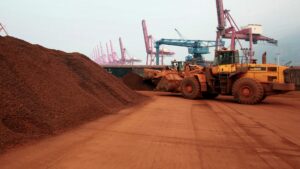Unpacking the Rare Earth Mineral Dilemma: Insights from Jim Cramer and the Future of U.S. Trade
In a world where technology and defense are intertwined with geopolitics, the importance of rare earth minerals has soared to an all-time high. Recently, CNBC’s Jim Cramer illuminated this issue, calling for urgent negotiations between the United States and countries outside of China to secure these critical resources. Let’s explore why rare earths matter, what Cramer suggests, and how the Extreme Investor Network believes this could reshape investment opportunities.
The Global Landscape of Rare Earth Minerals
China currently holds a staggering dominance in the rare earth mineral market, producing approximately 60% of these essential materials and processing almost 90% of global supplies. These minerals are pivotal not only for electronics but also for the automotive and defense sectors. The U.S.’s overreliance on China for these resources poses pressing strategic risks, especially as geopolitical tensions continue to rise.
This capability becomes even more apparent when considering China’s export restrictions, which were implemented in response to U.S. tariffs. As these restrictions pinch the supply chain, it becomes clear that the U.S. must act decisively to diversify its sources of rare earth minerals.
Cramer’s Call to Action
Cramer emphasizes the urgency of forming deals with countries like Brazil, Vietnam, and Australia, which also possess ample rare earth materials. He suggests that the U.S. should consider waiving high tariffs imposed on imports from these nations to facilitate quicker negotiations. As he aptly put it, “We need these rare earth deals with the same alacrity that the White House gave out reciprocal tariffs.”
In his words, the lack of these arrangements puts the U.S. at a disadvantage in negotiations with China. This acknowledgment raises an essential question: What were we thinking starting a trade war without securing our rare earth resources first?
The Investment Angle
At Extreme Investor Network, we understand that navigating such economic complexities can create unique investment opportunities. As the U.S. seeks to bolster its supply chains and reduce reliance on foreign nations, there is a growing market for companies involved in rare earth mining and processing outside China.
Proactive Strategies for Investors
Here are actionable steps for investors looking to take advantage of the shifting dynamics in the rare earth sector:
-
Research Global Players: Companies in Brazil, Australia, and Vietnam that specialize in rare earth production may witness increased demand as the U.S. seeks alternatives. Keep tabs on their stock performances and future projections.
-
Consider ETFs: Exchange-traded funds (ETFs) focusing on critical minerals can offer diversified exposure without the risks associated with individual stocks.
-
Watch Policy Changes: Stay informed about U.S. trade policies. Any moves to ease tariffs or form partnerships with foreign nations could significantly impact the market.
- Evaluate Tech Trends: As industries transition to green technologies, the need for rare earths will increase. Companies involved in battery production and renewable energy should be on your radar.
Conclusion
The insights from Jim Cramer underline the critical necessity for the U.S. to establish robust and diverse sources of rare earth minerals. The implications of this situation extend beyond politics; they present intriguing investment opportunities in a rapidly evolving market landscape. At Extreme Investor Network, we are committed to helping you navigate these complexities, equipping you with the knowledge and strategies you need to make informed investment decisions.
As the rare earth narrative unfolds, those who stay ahead of the curve will undoubtedly reap the rewards in this transformative era. Stay connected with us for the latest updates and insights that matter to your investment journey.

